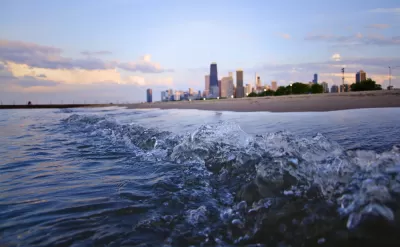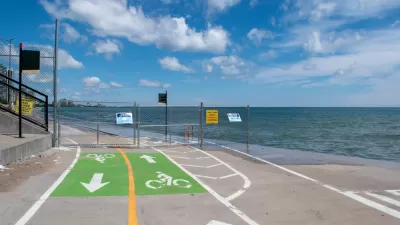Historically stable Lake Michigan has seen its water levels fluctuate dramatically over the last decade, posing increasingly urgent threats to lakeside property and causing severe droughts and flooding.

Although it "stands a half-continent away from the threat of surging ocean levels" and "hugs the shores of one of the grandest expanses of freshwater in the world," writes Dan Egan, Chicago is not immune from threats caused by climate change. Built on a swamp, the city faces the looming threat of rising water levels in Lake Michigan. High-rise buildings on the edge of Lake Superior, says Josh Ellis, former vice president of Chicago's Metropolitan Planning Council, are "just teetering on the edge of the lake" with "water lapping at their foundations."
"Lake Michigan’s water level has historically risen or fallen by just a matter of inches over the course of a year, swelling in summer following the spring snowmelt and falling off in winter. Bigger oscillations, a few feet up or down from the average, also took place in slow, almost rhythmic cycles unfolding over the course of decades." But "[i]n 2013, Lake Michigan plunged to a low not seen since record-keeping began in the mid-1800s, wreaking havoc across the Midwest." Then, "[j]ust a year later, in 2014, the lake started climbing at a stunning rate, ultimately setting a record summertime high in 2020 before drought took hold and water levels started plunging again."
This pattern is "threatening to upend centuries of relative stability along the Great Lakes’ 10,000 miles of shoreline, including the 22 miles that define Chicago’s eastern edge," writes Egan. "Beginning in fall 2019, a series of storms ravaged the neighborhoods that pocket Chicago’s mostly public shoreline. Nowhere has the lake been more menacing to lakefront property owners than the working-class neighborhood along South Shore Drive, about 10 miles south of downtown." As these extremes intensify, "the speed and uncertainty of the changes underscore how Chicago, in some crucial ways, is perhaps more immediately exposed to the dangers of global warming than cities on the ocean."
FULL STORY: The climate crisis haunts Chicago’s future. A Battle Between a Great City and a Great Lake

Maui's Vacation Rental Debate Turns Ugly
Verbal attacks, misinformation campaigns and fistfights plague a high-stakes debate to convert thousands of vacation rentals into long-term housing.

Planetizen Federal Action Tracker
A weekly monitor of how Trump’s orders and actions are impacting planners and planning in America.

In Urban Planning, AI Prompting Could be the New Design Thinking
Creativity has long been key to great urban design. What if we see AI as our new creative partner?

How Trump's HUD Budget Proposal Would Harm Homelessness Response
Experts say the change to the HUD budget would make it more difficult to identify people who are homeless and connect them with services, and to prevent homelessness.

The Vast Potential of the Right-of-Way
One writer argues that the space between two building faces is the most important element of the built environment.

Florida Seniors Face Rising Homelessness Risk
High housing costs are pushing more seniors, many of them on a fixed income, into homelessness.
Urban Design for Planners 1: Software Tools
This six-course series explores essential urban design concepts using open source software and equips planners with the tools they need to participate fully in the urban design process.
Planning for Universal Design
Learn the tools for implementing Universal Design in planning regulations.
Gallatin County Department of Planning & Community Development
Heyer Gruel & Associates PA
JM Goldson LLC
City of Camden Redevelopment Agency
City of Astoria
Transportation Research & Education Center (TREC) at Portland State University
Jefferson Parish Government
Camden Redevelopment Agency
City of Claremont





























